This is a linkpost for Ryan Beck's winning essay in Metaculus's Szilard Fortified Essay Contest. Essays focused on questions pertaining to long-term nuclear risks and called for authors to support their arguments with quantified forecasts.
Readers are encouraged to click through to the original essay where they can engage directly with the author and make their own forecasts.
Heightened geopolitical tensions can increase the risk of war, and when tensions between nuclear powers deteriorate the risk of nuclear war can increase. One such relationship facing heightened tensions is between the United States and China. This is particularly concerning as China has recently increased its nuclear stockpile and shown increased aggression toward neighboring states. This essay examines the risk of nuclear war between the US and China and offers possible means of lowering that risk.
Background
China's nuclear stockpile growth has been notable, increasing by 60 warheads from 2019 to 2020, the largest recent increase of any nuclear capable state (see the figure below from the Federation of American Scientists (FAS), US and Russia not shown).

Additionally, a report by the Pentagon estimates that China could expand to 1,000 nuclear warheads by 2030. As of December 6th the Metaculus community forecasts a 68% chance that China will have at least 420 nuclear weapons prior to 2024.
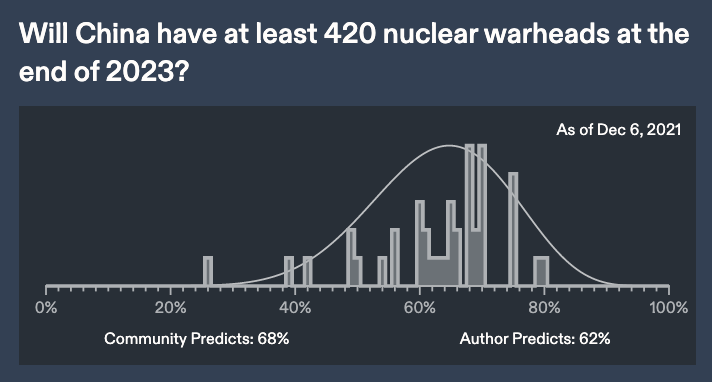
This is significant not only due to the proliferation of nuclear weapons, but also due to China's geopolitical situation. China has seen worsening relations with the US, as well as with neighboring countries such as Taiwan, Japan, and India. These worsening relations combined with the growth in China's nuclear stockpile could indicate an increased risk of nuclear war involving China.
The Risk
A nuclear conflict may not start as an outright offensive. A small scale clash, even one sparked by accident or misunderstanding, could quickly escalate. Below are the Metaculus community forecasts for a deadly armed conflict happening prior to 2024 between China and the states China appears to be at heightened tensions with.
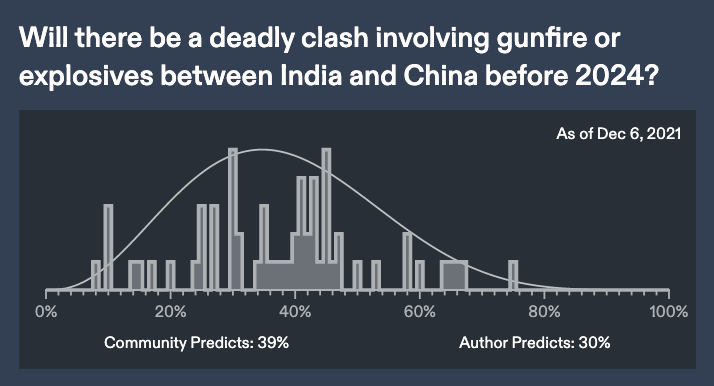
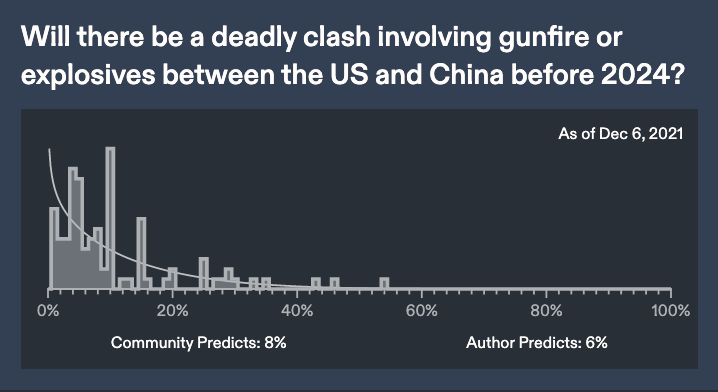
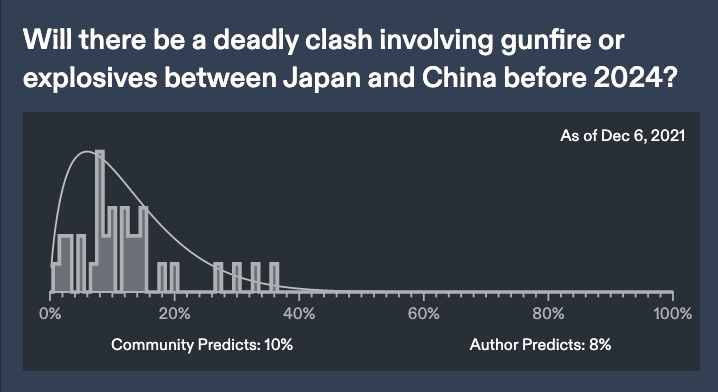
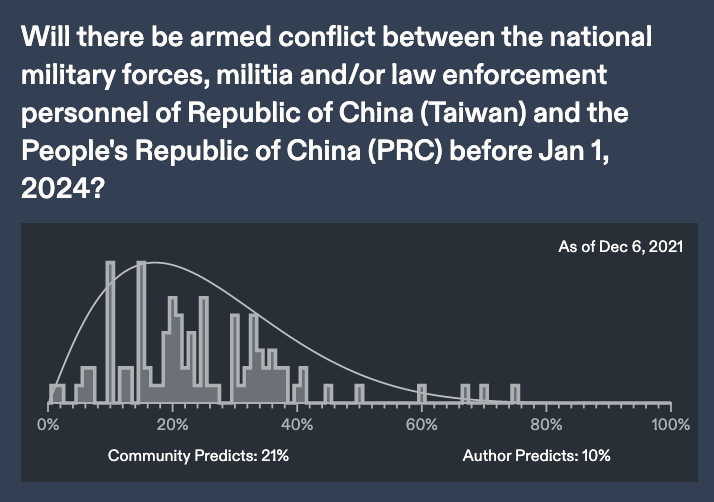
The community sees the largest risk of a clash with India, followed by Taiwan, Japan, and then the US. Notably the community places the probability of a clash with India at 39% and with Taiwan at 21%. These are forecasts for a ~2 year period. If those probabilities were to be sustained in the long term it would suggest over a 90% chance of a deadly clash with India in the next 10 years and over 90% chance of a clash with Taiwan in the next 20 years. However, it's likely that the community doesn't consider these probabilities to be perpetual, instead reflecting a current period of heightened tensions.
The Role of the US
The community forecasts an 8% chance of a deadly clash involving gunfire or explosives between the US and China by 2024, the lowest of any of the other countries so far mentioned. So why focus on the US? I have two main reasons. One is that the US is tied to varying degrees to India, Taiwan, and Japan, which means that conflict between China and any of these countries would pose a significant risk of drawing the US into direct conflict with China. The second reason is that this nuclear risk discussion is happening in a Western context and stakeholders are more likely to be able to influence policy in the US than other countries of interest.
While the latter reason is fairly self-explanatory, the former needs elaboration. Of the countries at risk of conflict with China mentioned above, only the US and India have nuclear weapons. The community forecasts a significant chance of deadly armed conflict between China and India by 2024, but many of these possible scenarios would not lead to a full scale war but instead may consist of isolated border clashes. As evidence that this is the case, compare the community forecast for this question involving a China-India war by 2035. The probability is significantly lower than would be implied by extrapolating out from the deadly clash question.
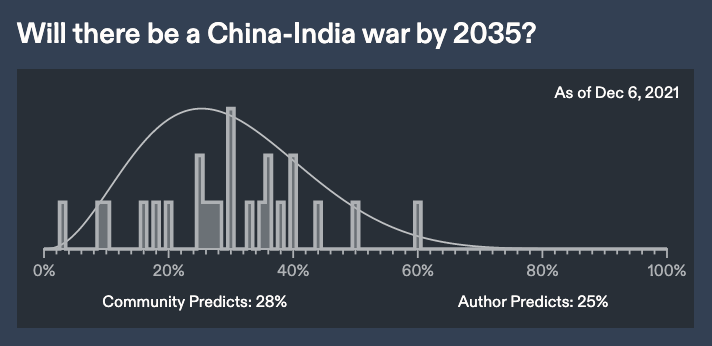
Additionally, when compared to the probability of war between the US and China by 2035, the difference between the community forecasts for these questions is only 6%, compared to a 31% difference in the forecasts for the deadly clash questions.
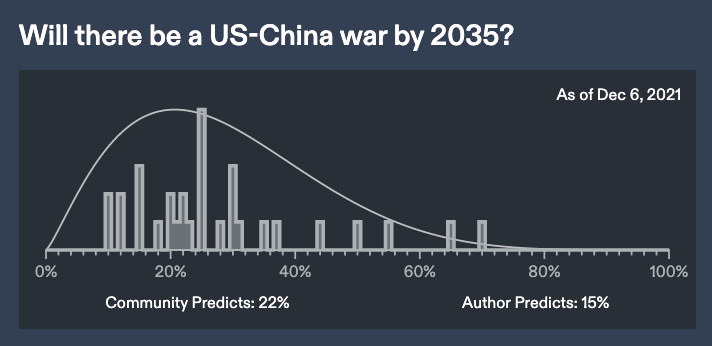
Japan and Taiwan have similar considerations due to their proximity to China. A deadly clash between these countries can occur for many reasons that may not result in full blown war, such as naval or aerial encounters in the straits between their countries.
In my view the risk of war between the US and China depends greatly on its relationships with India, Taiwan, and Japan. The US has a mutual defense treaty with Japan, has continued to develop its relationship with Taiwan and may defend it if attacked, and has been improving its relationship with India. If any of these countries enter into war with China, the chances of US involvement are significant.
Improving Relations by Ending the Trade War
The US has little ability to foster improved diplomatic relations between China and China's neighbors as its own relations with China are largely negative. Improving relations with China would not only provide the US with greater ability to foster diplomacy between these countries and China, but would also slightly raise the chances that a crisis or incident occurring between the two superpowers would be handled diplomatically. In my opinion the best avenue for improving US-China relations is by ending the trade war.
The US-China trade war began in 2018 when President Donald Trump raised tariffs on China. The intent was to put pressure on China to make changes to its trade practices, but several years have passed and tariffs are still at extreme levels; President Joe Biden has maintained tariffs on China and shows no sign of reducing them. This is despite the fact that most economists believe the burden of US tariffs imposed on China fall on US citizens and that imposing new tariffs does not improve Americans' welfare. Additionally, studies suggest that the tariffs result in a very large annual cost per job created.
In my view this is one of the biggest areas where the US could significantly improve its relationship with China with very little downside. There is significant room here for the US to take the first step on reducing tariffs, which could deescalate high tensions in this area of the US-China relationship. Reducing tariffs without demanding concessions from China could be a win-win; it eliminates an ineffective and costly policy and could improve relations with China. The main downsides are political. The US may not want to appear weak, reducing tariffs could damage the political standing of the executive with the industries protected by these tariffs, and it means giving up the leverage intended to be gained by imposing the tariffs. But these political costs could be reduced by communicating to the public the evidence showing tariffs are ineffective, and whatever leverage may exist has so far failed to produce meaningful improvements in trade status for the US.
Limited Alternatives
I think the trade war is the best option for improving diplomacy because other US-China issues are more complex and have less room for meaningful shifts. Below is a brief overview of some of the biggest points of contention and why they're more complex.
- Taiwan: US-Taiwan relations have grown in recent years, which has caused China to react with aggressive displays. There is little room for improvement here, as China-Taiwan relations have a long history, and the US must walk a fine line between supporting Taiwan but also not signaling to Taiwan that US support will enable Taiwan to declare full independence, which could raise the likelihood of hostilities from China.
- Uyghurs and Hong Kong: The treatment of the Uyghurs in China and China's oppressive actions toward Hong Kong have led to condemnation from the international community, including the US. This is an area where the US is unlikely to back down, and it should not back down as support for human rights is important.
- General Diplomacy: Limitations on journalists, closing of consulates, semiconductor technology disagreements, revocation of student visas, Olympics diplomatic boycott, and more. There is potential here for improvement in relations, but the breakdown in relations has been broad and is often tied to the other difficult issues mentioned in this section.
While there isn't much room to improve relations in these areas, it's possible that the positive effect on relations caused by ending the trade war could open up more opportunities for improved relations.
Conclusion
The US and China face a significant risk of conflict due not only to the negative relationship between them, but also due to the negative relationship between China and its neighbors, including countries to which the US has made commitments of support and, in the case of Japan, defense. The Metaculus community has forecast the risk of war between the US and China to be 22% by 2035, which should concern everyone interested in preventing nuclear warfare. To reduce this risk, efforts should be made to improve the relationship between the US and China without the US sacrificing its support for human rights and for its allies. One potential means of accomplishing this could be by ending the trade war, a solution which has significant upsides for the US and manageable domestic political risks.

Really enjoyed the way forecasts were integrated into the essay. Seems like a really useful approach!
I broadly agree that ending the trade war would be good. I'm not sure it's as easy to mitigate the political downsides as you suggest, though. I think it's quite unlikely that "these political costs could be reduced by communicating to the public the evidence showing tariffs are ineffective". Mostly because it's difficult to explain such a complicated issue on which people's intuitions point the other way. But also because it would be a political act and you'd have half the politicians in the country spreading the opposite message.
One longer-term scenario I'd have some credence in is: if Biden were to follow through on this action, I'd expect it to have a negative effect on his chances for re-election (maybe make it 1-5% less likely?), and any increase in the chance of Biden losing the next election could be worse for US-China relations than the gain from ending the trade war (something like 50% confidence).
I'm also not sure it's true that "other US-China issues are more complex and have less room for meaningful shifts". This seems to neglect the fact that the US and China have mostly managed to continue cooperating on climate change negotiations even though relations on the whole have remained frosty. I'd be a fan of trying to find other issues of common ground, even if they're less important than bilateral trade or territorial issues. For example, perhaps they could coordinate on space governance, clean tech investment, arms control, and maybe foreign aid?
I think cooperation on issues of lesser importance can be helpful as they allow countries the chance to show they can agree and uphold agreements, build trust, build personal ties between elites and diplomats, and reduce misunderstandings and misconceptions of the other side's intentions.
Your comment is 3 months old, but somehow I missed it back when I was posted and am just now seeing it, so I just wanted to say these are all good points, particularly about cooperation on other issues like your climate example!